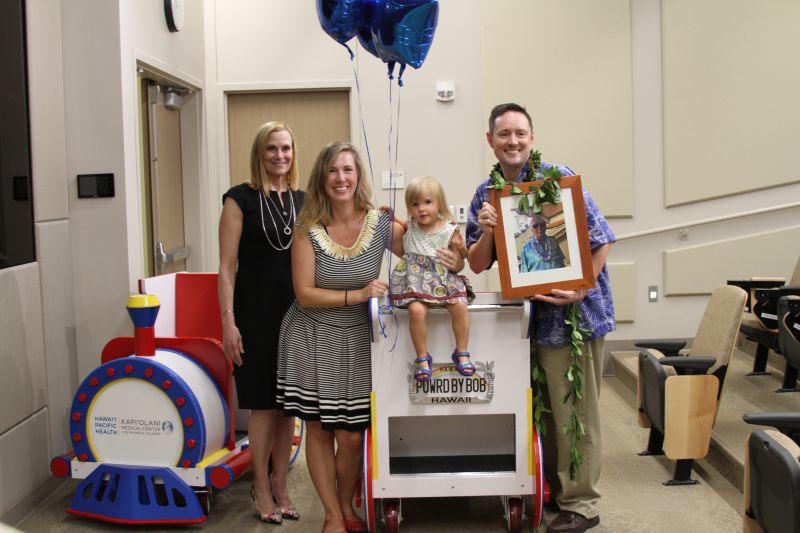Inspire 2018 SPRING
Kapiolani: Next Stop: Home
 The Wurst Ohana with the donated discharge train
The Wurst Ohana with the donated discharge train

Young patients have another reason to smile when they leave Kapiolani Medical Center for Women & Children. In January, new mini trains began giving discharged keiki rides from their rooms as a celebratory good bye. The trains are the result of series of events involving a premature birth, a long friendship and a donor's dying wish. Adding to this train tale, the long journey taken to make this a reality, from the inspired idea on Maui, creation in North Carolina and final destination in Honolulu.
It began when Upcountry Maui couple Barry Wurst II and his wife Julia were expecting their first child. Everything was going as planned until at 32 weeks pregnant, Julia discovered she had preeclampsia. “I was medevacked to Kapiolani the same day I was diagnosed,” she said. “It was a very scary experience. I didn’t know what was going to happen.”
“I had Beatrice a few days later at Kapiolani and she was perfect, just really small at 3 1/2 pounds. I spent some time in the intensive care unit and Beatrice was in the neonatal intensive care unit for five weeks.”
When the healthy baby returned to Maui, the extended family shared details of Beatrice’s early arrival with friends—including Barry’s dad, Barry Wurst I. The senior Barry told his best friend Bob Douglas about the lifesaving care his granddaughter received at the state’s only children’s hospital. Bob decided he wanted to help.
Bob called the Kapiolani Health Foundation and said, “I’m inspired to make a gift and it’s going to be something big.”
In meetings to follow, the Kapiolani team got to know Bob and understand his desire to donate. Bob was legally blind and made a career of giving to others. One of the projects he started was the Christmas Cheer Project on Maui in 1994 which gave Christmas trees and food baskets to families in need. The program grew to support Molokai families as well, with as many as 100 trees and baskets donated annually in the final years of the project.
Now Bob wanted to make the road to recovery a memorable one for kids from the moment they started their journey home. “Bob was very detail oriented, and made going home so much more fun and special for our patients,” said Martha Smith, CEO of Kapiolani. “The trains have custom Hawaii license plates that say ‘Powered by Bob,’ there is a train whistle and with the press of a button, a child’s voice says ‘Next stop home.’ Bob thought of everything!”
The fun design was inspired by a similar train Bob funded for Levine Children’s Hospital in North Carolina a year before. Bob wanted trains for both hospitals, two for Kapiolani and another for Levine, to launch on the same day at the same time in both states. That’s exactly what happened on January 3, 2018.
Unfortunately, the 82-year-old was not able to see his dream come true. Bob died of cancer two months before the scheduled launch. His lifelong friends, the Wurst family, represented him at the unveiling at Kapiolani and 2-year-old Beatrice was the train’s first passenger.
“To see my daughter filled with joy in the train as she was going down the hallway and to think she is the first of countless children who are going to be doing this is touching,” Barry Wurst II said. “This is exactly what Bob wanted.”
For Barry, Julia and Beatrice, returning to Kapiolani brought their story full circle. Bob’s trains will also bring closure to many who experience it.
“Bob will always be remembered for this unique gift,” Martha said. “Bob also allowed us to share the aloha spirit with Levine Children’s Hospital. Both of our facilities are focused on helping kids get healthy and these discharge trains set the tone of being on the right track when they leave us.”
Bob also made significant donations to Kapiolani to support pediatric oncology and women’s health, primarily ovarian cancer treatment. With all of his gifts, Bob leaves behind quite a legacy at Kapiolani and in Hawaii.
“It’s amazing that somebody could spend so much of his time giving,” Barry Wurst II said. “It’s very easy in this life to take and with Bob, he wanted so much to give. He took such great satisfaction in it to a really remarkable degree.”

